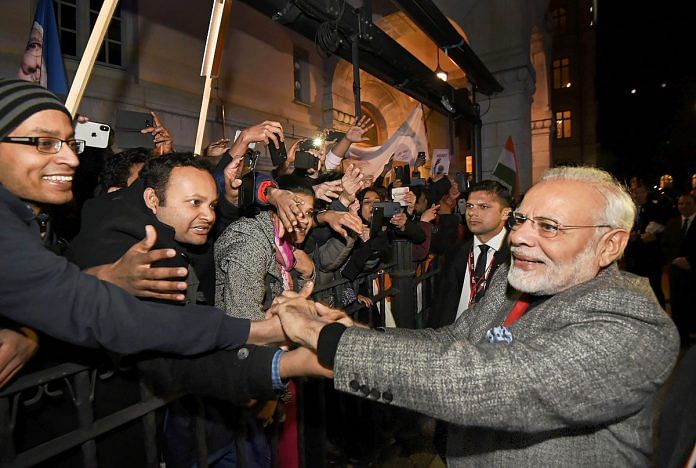Prime Minister Modi is reportedly one of only three attending Commonwealth leaders invited for an audience with Queen Elizabeth II Wednesday evening.
New Delhi: When Narendra Modi arrives in London Wednesday for the Commonwealth Heads of Governments meeting (CHOGM) , he will become the first Indian Prime Minister to attend the summit of former British colonies since 2009.
But that is not all. In what is being regarded as an “unprecedented welcome”, Prime Minister Modi is reportedly one of only three attending leaders invited for an audience with Queen Elizabeth II Wednesday evening, and the only one offered two bilateral meetings with British PM Theresa May on the sidelines.
Modi’s ‘royal welcome’ will include a special event hosted by Prince Charles, during which the heir to the British throne will drive up in Tata Motors’ first electric Jaguar to symbolise the India-UK technical collaboration.
Held every two years, this edition of the CHOGM is scheduled for 19 and 20 April.
Courting the ‘Raj’
The CHOGM comes at a time when Britain finds its global clout diminishing ahead of Brexit. With Britain moving its diplomatic focus away from Europe, London is going out of its way to woo India. For example, Britain reportedly made sustained efforts to ensure India’s participation at the PM level at the CHOGM, including a special invitation from the monarchy.
“When Britain loses its privileges in the European Union, it will depend on countries like India to have stronger bilateral relationships,” said former Indian diplomat Lalit Mansingh, India’s high commissioner to Britain between 1998 and 1999. “After all India is the fastest growing free-market economy and now de facto the fourth largest economy in the world,” he said.
He added that India may not have taken Britain so seriously in 2016, when Theresa May came to India on her first visit as PM outside Europe, “because it did not know how long Brexit would take or whether May was competent to suggest a free-trade deal”.
However, “now that the country is going through with Brexit, the time to discuss has come”, he added.
According to Arun K. Singh, India’s former ambassador to the US and France, while European nations had formed the focus of Britain’s relationships ahead of the Brexit vote, the British were now “aggressively trying to project themselves as non-isolated”.
India’s plan
Of late, India has focused on consolidating its place in the United Nations Security Council, and technical and ‘south-south cooperation opportunities’, that is alliances with fellow developing nations. The focus is part of India’s goal to pursue wider global engagements in a bid to bolster its image as an emerging world power.
The Commonwealth, a group of 53 former British colonies, offers India another portal to chase this goal, say experts. And there have reportedly been calls for India, as the Commonwealth’s biggest member, to play a bigger role in the grouping.
According to Dinesh Patnaik, India’s deputy high commissioner to Britain, New Delhi’s growing closeness to London is merely a reflection of the country’s growing engagement with multilateral bodies. The Commonwealth, he said, “is no different”.
“There is a desire to play a greater leadership role in the international arena and the UK wants India to take on a more important role,” he added.
Former foreign secretary Kanwal Sibal said India didn’t exactly want to “warm up” to Britain. “India wants to use the opportunity that a declining and exhausted Britain is giving the country to increase its profile,” he added. Sibal said India wanted to be seen playing an independent role in the Commonwealth, rather than Britain’s.
“For instance, the post of the deputy secretary general in the Commonwealth will be… given permanently to an Indian so that India will have a well-defined and independent role and won’t be subservient to the Commonwealth secretariat,” he said.
“Commonwealth,” added Arun K. Singh, “with its global-level membership could be a useful forum to reinforce democratic norms and a rules-based international order. It could be a platform to deal with the challenge of China’s Belt and Road Initiative.”
“The Commonwealth is an established international platform of 53 countries and if it is a platform that can project India as a global power, there is advantage in taking part in CHOGM and taking an active interest in CHOGM affairs,” added Mansingh.
However, he said that, despite everything, New Delhi had good reason to build a strong rapport with London.
“Though Britain may be losing its international stature, it is still a major power… London is still the number one financial centre in the world,” he said, adding that India’s deepening ties with the UK should also be seen in the context of their historical relationship.
“Britain has a major Indian diaspora, which is influential and second only to the diaspora in the US,” he said, “So, Britain still matters… Britain after Brexit will be independent of the European Union (EU) and therefore we have to deal with Britain as a separate entity.”



